 Petzlover
Petzlover Belgian Shepherd Dog (Tervuren) is originated from Belgium but Galgo Espanol is originated from Spain. Both Belgian Shepherd Dog (Tervuren) and Galgo Espanol are having almost same height. Both Belgian Shepherd Dog (Tervuren) and Galgo Espanol are having almost same weight. Belgian Shepherd Dog (Tervuren) may live 3 years less than Galgo Espanol. Both Belgian Shepherd Dog (Tervuren) and Galgo Espanol has almost same litter size. Belgian Shepherd Dog (Tervuren) requires Moderate Maintenance. But Galgo Espanol requires Low Maintenance
Belgian Shepherd Dog (Tervuren) is originated from Belgium but Galgo Espanol is originated from Spain. Both Belgian Shepherd Dog (Tervuren) and Galgo Espanol are having almost same height. Both Belgian Shepherd Dog (Tervuren) and Galgo Espanol are having almost same weight. Belgian Shepherd Dog (Tervuren) may live 3 years less than Galgo Espanol. Both Belgian Shepherd Dog (Tervuren) and Galgo Espanol has almost same litter size. Belgian Shepherd Dog (Tervuren) requires Moderate Maintenance. But Galgo Espanol requires Low Maintenance
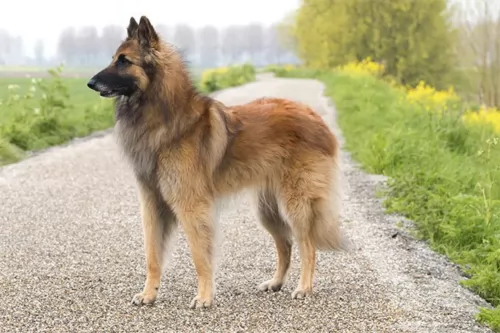 Referred to as the ‘Terv’, this dog from Belguim was created in the late 19th century. He is one of 4 varieties of Belgian Shepherd and he has a long, fawn colored coat. It was in 1892 that the first show for Belgian Shepherds took place and it was the Tervuren variety that won.
Referred to as the ‘Terv’, this dog from Belguim was created in the late 19th century. He is one of 4 varieties of Belgian Shepherd and he has a long, fawn colored coat. It was in 1892 that the first show for Belgian Shepherds took place and it was the Tervuren variety that won.
Breeders of these dogs gave each of the four varieties their own name, and the name Tervuren comes from a Belguim village. This is where M.F. Corbeel bred dogs, believed to be the foundation of the Tervuren breed.
In World War I, many of these dogs were used by the military for war related jobs. Some of these dogs were imported to America for breeding and in 1959 it was considered a separate breed from other Belgian Sheepdogs.
 Galgo Espanol means Spanish with galgo meaning greyhound, thus a Spanish Greyhound. This breed is ancient with their roots in perhaps the English greyhound and others in the sighthound family. They are much like the greyhound in that they are laid back, calm, gentle and quiet, unless they are competing on the local track. Like the greyhound they are shy and reserved; great with kids and other pets. And of course, they love cats.
Galgo Espanol means Spanish with galgo meaning greyhound, thus a Spanish Greyhound. This breed is ancient with their roots in perhaps the English greyhound and others in the sighthound family. They are much like the greyhound in that they are laid back, calm, gentle and quiet, unless they are competing on the local track. Like the greyhound they are shy and reserved; great with kids and other pets. And of course, they love cats.
There are dogs like the Galgo referred to in writing by the ancient Celts and Romans. One author, Arrian, had his own Galgos and used them when hunting. The breed flourished in the second half of the Middle Ages in Spain and well into the 8th century. When the Christians regained control of the Iberian Peninsula, they did away with the hunter old forms of hunting and introduced a new form with hounds that made the Galgo the pride of the aristocracy and not in the homes of the ordinary people. Arrian claim to two types of dogs, the smooth and rough coated.
Muslim and Chrisitan Kings kept Galgo Espanols. In all probability the Saluke and Galgo were crossbred at this time. It was illegal to kill a Galgo and in 1081, the Mayor of Cartuario of Slonza left his Galgo in his will to Diego Citid. Dogs seen in painting from the 12th century look just like dogs of this breed who can be seen today.
It is believed that when the Galgo was developed, it was in the midsection of Spain or the Castillian plains. They ruled the interior of the country while the bloodhound ruled the exterior. The 18th and 19th centuries saw very little change in the breed. However, in the 20th century, there was cross breeding with the English greyhound that produced a leaner, faster and powerful track racing dog. The results was a faster dog without the long distance stamina of the pure Galgo. For this reason, the breeders returned to breeding the pure professional racing dog.
The sport of racing the Galgo earns Spain around sixty million dollars per year. They train anywhere from three to four thousand of the Galgos every year for Open Field Coursing Championships. Still, there no longer is any cross breeding between the Greyhound and the Galgo. The current coursing programs feature a hare that is much hardier and difficult to pursue so the stamina of the old Galgo Espanol is desired. In Castile, where these games are played, the landscape is open with large fields that requires that the hare travels far greater distances. This means that the stamina of the original Galgo Espanol is needed.
When not racing the Galgos have become great house pets. They have a reputation as gentle dogs that are docile and quiet, with good health. This reputation is well earned. They are also successful show dogs in Europe much more than the states. This is perhaps because they are really rare outside of Spain. They are not recognized by the United Kennel Club nor the American Kennel Club.
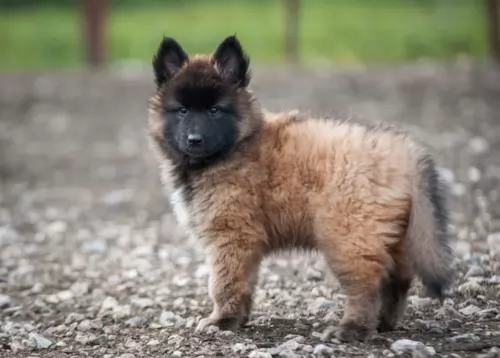 The Tervuren is a medium to large sized, well muscled dog achieving heights of up to 66cm. He has an attractively elegant, regal look to him. The dog has a double coat which is weather resistant. The overall length of the coat which is fawn to mahogany is medium to long and the outer coat is straight with black tips. The males have almost like a mane of hair around the neck that you won’t necessarily find with the females. The tail is long and feathery
The Tervuren is a medium to large sized, well muscled dog achieving heights of up to 66cm. He has an attractively elegant, regal look to him. The dog has a double coat which is weather resistant. The overall length of the coat which is fawn to mahogany is medium to long and the outer coat is straight with black tips. The males have almost like a mane of hair around the neck that you won’t necessarily find with the females. The tail is long and feathery
The Belgian Tervuren is alert and intelligent. His has a long-shaped face with a black mask and upright ears that are sharp and receptive to every sound. He is a herding dog and is full of energy – used to having a job that keeps him busy.
If you don’t want your Tervurens to become destruction, you will need to keep him busy and not just keep him cooped up in the back yard. This particular dog breed is a devoted, loyal pet and forms a strong bond with his human family. However, he will need to be trained and socialized if you want him to behave well around children and pets in the home.
 Obviously the Galgos looks a lot like the Greyhound, but in some very important ways they are very different. The rear of the Galgos is higher than the front and their muscle are flatter. They are built for endurance while the Greyhound is built for speed. The Galgos is a lighter, smaller dog with larger ear on a long head. They have long tails and their chests are not deep like the Greyhounds.
Obviously the Galgos looks a lot like the Greyhound, but in some very important ways they are very different. The rear of the Galgos is higher than the front and their muscle are flatter. They are built for endurance while the Greyhound is built for speed. The Galgos is a lighter, smaller dog with larger ear on a long head. They have long tails and their chests are not deep like the Greyhounds.
The Galgo comes in smooth and rough coats and a variety of colors. The rough coat protects dogs that are in climates colder than the ones in Spain and also keeps them from injuring their skin while running. The colors include brindle, black, golden, toasted, cinnamon, yellow, red, white, white with patches, or any color as long as they have a white forehead and muzzle.
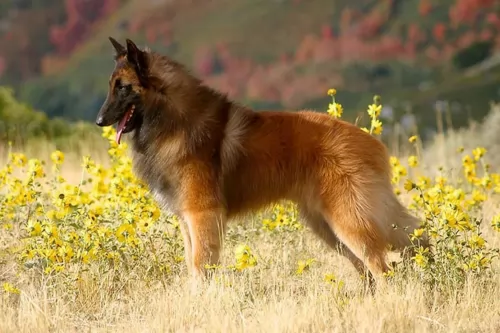 With his beautiful face and lustrous coat, this is a pet that you’re always going to be proud of. Not only that, he is active too, a great watchdog and a fantastic family companion.
With his beautiful face and lustrous coat, this is a pet that you’re always going to be proud of. Not only that, he is active too, a great watchdog and a fantastic family companion.
To keep your Tervuren spritely and contented, ensure he has a high quality diet designed for active herding dogs. He is intelligent too and training and socialization will turn him into an exceptional pet for you. Provide him with lots of human companionship, give him nutritious food and see that any ailments he has are attended to by the vet and you’ll have your attractive pet around with you for up to 12, 13, 14 or 15 years.
 They are good with children, but you need to be careful no one gets knocked down or hurt.
They are good with children, but you need to be careful no one gets knocked down or hurt.
Stamina for running and a good record in lure coursing.
Though they can be couch potatoes like greyhounds they are better off with a fenced yard and not an apartment.
They are smart and can learn anything you want to teach them if you can keep their attention.
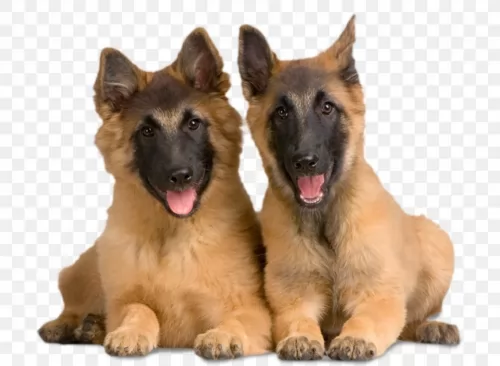 Your Tervuren is a robust, healthy dog breed and with the right food, love and attention, you’re not going to have major health concerns with him. Skin allergies, eye problems and hip dysplasia might be something you want to be aware of.
Your Tervuren is a robust, healthy dog breed and with the right food, love and attention, you’re not going to have major health concerns with him. Skin allergies, eye problems and hip dysplasia might be something you want to be aware of.
A dry, itchy skin with incessant scratching from your pet might require a visit to the vet. If left untreated, an itchy skin and a scratching dog can lead to secondary skin infections and even hair loss. Check for allergies or fleas, and remember that apart from medical management of fleas and ticks, dogs with a dull coat will require a supplement with omega 3 fatty acids.
A common skeletal disorder with malformation of the hip brought on by environmental- and genetic factors. Recognizing the signs of hip dysplasia is important for your dog to help him with pain.
 Being a large dog, the Galgo Espanol would normally face a high probability of hip dysplasia. Fortunately for the breed this is not true. In this respect their lightness of weight, their history as a working dog and their anatomy have protected them from it. They are however susceptible to other issues.
Being a large dog, the Galgo Espanol would normally face a high probability of hip dysplasia. Fortunately for the breed this is not true. In this respect their lightness of weight, their history as a working dog and their anatomy have protected them from it. They are however susceptible to other issues.
Malignant tumors that quickly spread throughout the body. Life threatening.
As a sighthound, the Galgo Espanol is prone to have issues anytime with anesthetics. They don’t metabolize the anesthetics like other dogs do. They will take longer to revive, and they are susceptible to hypothermia while under an aesthetic.
While running, they are prone to injuries
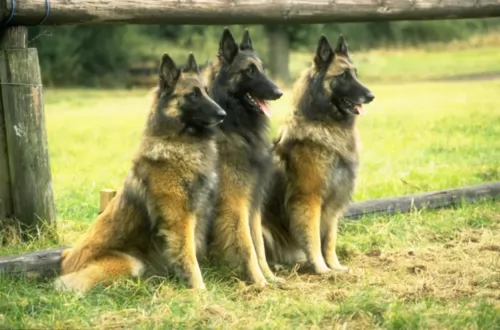 Your Terv is a double-coated dog and he will shed his hair throughout the year. Brushing him at least twice in the week will be necessary to get rid of the hair he sheds. Apart from brushing him and keeping his beautiful coat shiny and healthy, other grooming needs will include clipping his nails and dental hygiene. Brushing his teeth 2 or 3 times a week with specialized dog toothpaste and toothbrush will help with keeping plaque and bacteria at bay.
Your Terv is a double-coated dog and he will shed his hair throughout the year. Brushing him at least twice in the week will be necessary to get rid of the hair he sheds. Apart from brushing him and keeping his beautiful coat shiny and healthy, other grooming needs will include clipping his nails and dental hygiene. Brushing his teeth 2 or 3 times a week with specialized dog toothpaste and toothbrush will help with keeping plaque and bacteria at bay.
Speak to your vet about feeding your Tervuren puppy as he will need at least 4 bowls of food while he is so tiny. By the time he is a year old, he will be able to have 1 or 2 meals a day. Always make sure you feel him high quality food which can be home-made food or commercially manufactured food.
To ensure he doesn’t suffer with any skin allergies, he will need to have some raw meat mixed into his food from time to time. Always provide fresh water for him and make sure to wash the bowls out often.
 Feed your puppy a high quality dry food made for large breed dogs. Feed 3 meals a day 2.5 to 3 cups total for the day.
Feed your puppy a high quality dry food made for large breed dogs. Feed 3 meals a day 2.5 to 3 cups total for the day.
Feed your adult Galgo a high quality dry food made for large breed dogs. Feed 2 meals a day but don’t overfeed Give 4-5 cups total for the day.
They have amazing stamina and good speed. Generally good health as a breed.
He can be a couch potato indoors and runs forever outdoors. He does need daily exercise and bedrest both. The best would be if you could sprint him every day or have a small yard he can play in. They excel of course at agility and lure coursing. Keep them on a leash because if they run you will never catch them. The American Sighthound Field Association presents lure coursing events that they are eligible for. They have exceled at show competition in Europe but are not well known in the U.S.